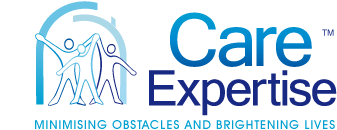
Methodologies
PROACT-SCIPr-UK®:
Positive Range of Options to Avoid Crisis & use Therapy Strategies for Crisis Intervention and Prevention
Accredited by the British Institute of Learning Disabilities for managing people with behaviours of concern, this approach is in keeping with Care Expertise’s practice of using minimal, non-restrictive methods of physical intervention. Some Care Expertise staff are also qualified PROACT-SCIPr-UK® instructors who can offer training to other staff members when needed.
TEACCH
The primary aim of the TEACCH programme is to help to prepare people with autism and related developmental disorders to live or work more effectively at home and in the community through the two strategies of improving skills by means of education and of modifying the environment to accommodate deficits. Based on the principle that the person is the priority, individuals are encouraged to develop their own potential, working with existing strengths and emerging skills, rather than having to meet pre-determined expectations of “normal”.
PALLS
Preferred Activities Learning Life Skills Support
The simple principle of PALLS is to incorporate learning opportunities and skills development around the service user’s identified preferred activities. For example for a service user who enjoys food and eating, staff use this avenue to develop skills in food preparation and deferred gratification as well as table laying and washing up. Similarly an individual who enjoys swimming will be motivated to learn the necessary skills to enable this activity i.e: packing a swimming bag, travelling on public transport, the transactions required to enter the pool, getting changed and so on.
Augmented Communication
This term describes the methods used to assist and understand service users with communication difficulties. These methods include MAKATON – a signing language, the use of photographs of activities and objects that have real meaning for the service user, objects of reference, and other communication systems that have real meaning to the individual. The Pictorial Exchange Communication System (PECS) uses photographs and symbols to aid communication by exchanging the picture or symbol, for example of a cup of tea, for the real thing. Other symbols can be used to structure the individual’s day who is then encouraged to adhere to the agreed timetable.
Positive Behaviour Support
Behaviours of concern are difficult to change because it is functional, i.e. it serves a purpose for the individual and is reinforced in the service user’s environment. As part of the assessment process, staff will identify the nature of and the context in which behaviour will or will not occur and the consequences that maintain that behaviour. By changing stimulus and reinforcement in the environment, for example in the way in which staff interact with the service user, behaviour can be changed.
Active Support
Active Support is about providing person-centred assistance to individuals in a way which ensures that they are engaged and participate in their own support. It focuses on doing things WITH people as opposed to doing things FOR or TO them. The aim is for service users to be interested and engaged in their own lives, enhancing their skills development, self-esteem and self expression.
Care Expertise Services:
Residential Care Homes
We have 5 Residential Care Homes: Norcrest, Oakfield, Retreat Lodge, Spring Lake & Maple Manor. >> read more
Supported Living Services
We have 12 Supported Living Services: Autumn Leaves, Blake house, Canterbury House, Conifers, Court Lodge, Greyhound Lane, Haven Flats, Kings Court, Knights Court, Manor Drive, Summer Breeze, The Grange. >> read more
Client Groups Supported
Care Expertise supports people with:
- Learning Disabilities
- Autism & other Developmental Disorders
- Mental Health needs
- Communication needs
- Sensory needs
- Epilepsy
- Dementia
"The very best in professional care, delivered with understanding and sensitivity."
